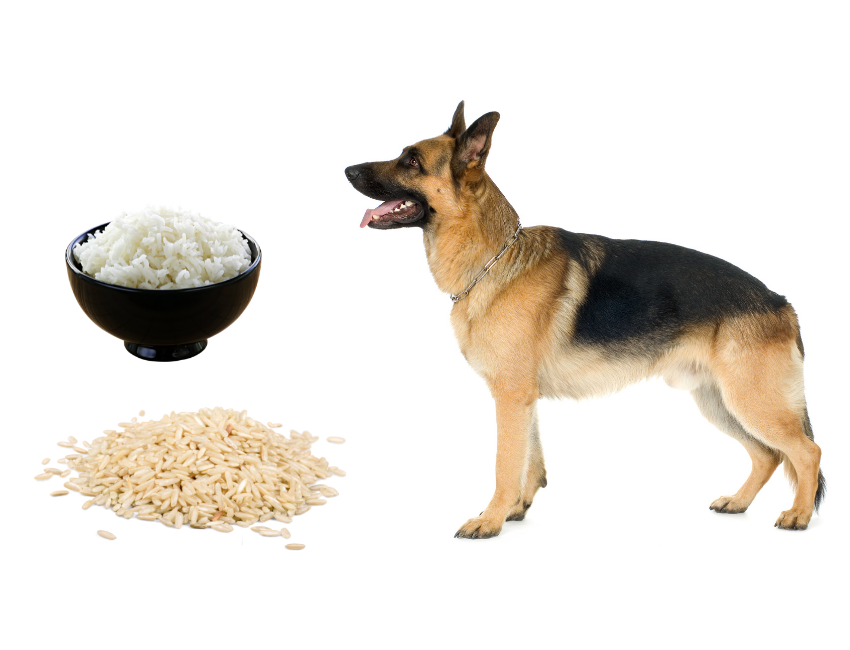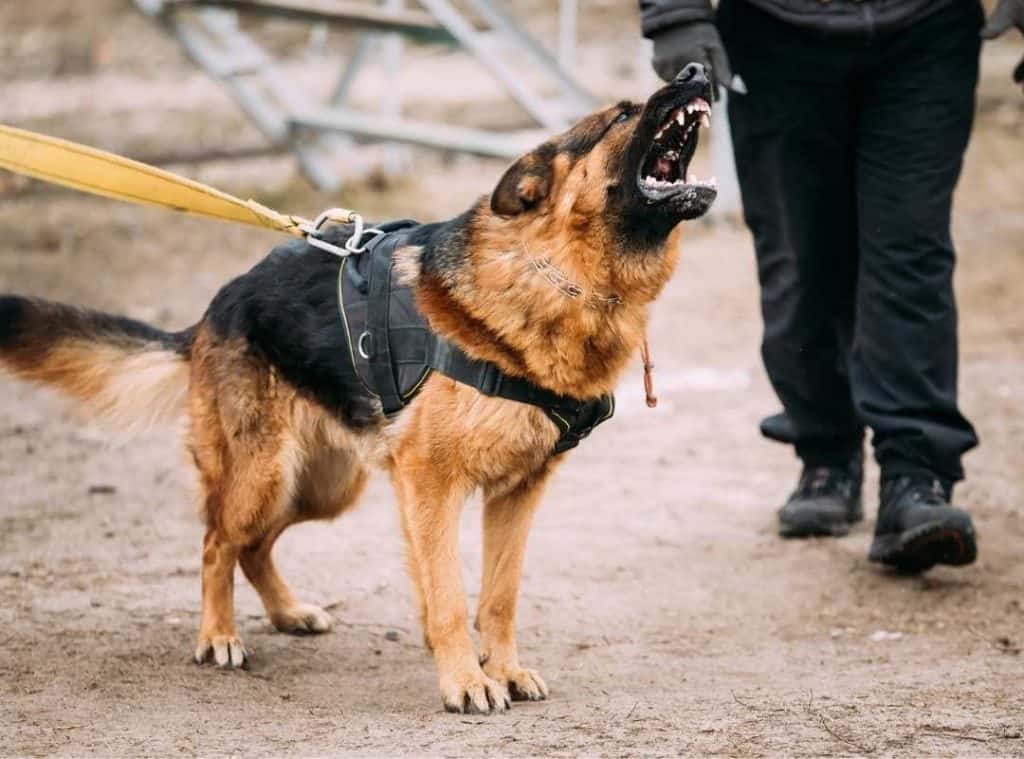This post may contain affiliate links. If you click an affiliate link and make a purchase, I may earn a commission. Also, as an Amazon Associate I earn from qualifying purchases.--
German Shepherds are one of the most popular breeds of dogs in the world. They are often considered to be one of the best guard dogs because of their instincts and their bravery. However, many people are not aware that German Shepherds can eat rice.
In this blog, we will discuss the benefits of rice for German Shepherds and how you can feed them in moderation.

Can German Shepherds Eat Rice?
Yes, German Shepherds can eat rice. In fact, rice is a common ingredient in dog food formulas because it helps to hold stools together and can be helpful for dogs who suffer from diarrhea. Rice is a healthy food for dogs, so it’s good for German Shepherds too!
Can German Shepherds Eat Brown Rice?
Yes, German Shepherds can eat brown rice. In fact, it is a healthier alternative to white rice and has more nutrients than plain white rice. The seed coat is still present in brown whole grain brown rice, providing nutritional value that is not found in white rice.
However, because brown whole grain brown rice has a higher calorie count than plain white rice, it should be given in smaller quantities to avoid overfeeding your dog and being wasteful. A dog’s daily caloric intake should not exceed 10% of their total intake, which is ¼ cup of brown rice mixed with their food.
Difference between white rice and brown rice:
There is a big difference between white rice and brown rice when it comes to your dog’s diet. Brown rice contains the seed layer, which means that the proteins and vitamins are still intact. This type of processed rice is not digestible by German Shepherds, so it is not recommended that you feed it to them.
White rice, on the other hand, has had the seed layer polished off of it, meaning that the proteins and vitamins have been removed. It is safe for your German Shepherd to eat, but make sure you don’t give them too much or they may become malnourished. Rice should only be given to your pup as a carbohydrate sparingly.
Just like people, dogs have different digestive systems and will react differently to various foods. Consult with your vet before feeding anything new to your furry friend–even if you think it’s harmless! And remember: always cook white rice before serving it to your pup.
At What Age Can A German Shepherd Puppy Eat Rice?
There is no definitive answer to this question as it will depend on the individual dog’s diet and health. However, it is generally recommended that puppies should not eat rice until they are at least four months old.
The German Shepherd is a true omnivore, and can consume raw meat and cooked rice from around 8 weeks old. Mother’s milk will help the puppy build an immune system before the age of 8 weeks. Puppies need a minimum of 22% of maintenance protein for development and muscle strength.
When they reach six months old, you should change your German Shepherd’s diet to prevent any bone or joint health issues. A puppy’s diet should consist of 1740-2100 calories, with 8% fats for energy requirements and a minimum of 22% protein for development and growth purposes.
The age a German Shepherd should be fed rice varies depending on the breed, but some adult dogs may also eat rice, although it is not recommended as it can increase their risk of developing dental issues later in life.
What are the Benefits of Rice to German Shepherd Dogs?
Rice is an excellent food for German Shepherds, providing several benefits for you German Shepherds. Here are some of the benefits:
- Gluten-Free
Many people are looking for gluten-free alternatives to the food they eat every day. For those with celiac disease, eating gluten can cause a lot of damage to the small intestine. But what about our furry friends? Dogs can also have problems with gluten, and rice is a great alternative for them. Rice is a cheaper alternative to gluten-free food, which can be difficult on dogs that are allergic.
Rice provides carbohydrates, protein and fiber for your German shepherd as well as being an excellent source of carbs. Uncooked rice is okay for feeding your German shepherd when it’s appropriate for them – like when they’re sick or recovering from surgery. When feeding your GSD rice, you should only do so in moderation because uncooked rice can cause gastrointestinal upset in some animals.
Rice is a common ingredient in dogs’ food and it’s also easy to make at home. Rice is healthy for both human and dog consumption, and it makes up the largest proportion of any single ingredient in your local grocery store or vet clinic.
- High in Nutrients
Rice is a good source of proteins and carbohydrates for German Shepherd Dogs. It also contains fiber, which aids in the production of healthy intestinal pH, preventing unwanted bacteria from growing in your dog’s gut. Rice absorbs excess water, making it necessary for bowel regularity in dogs. The benefits of rice for German Shepherd Dogs include a well-formed and firm stool.
The slow but sustained energy from brown rice boosts stamina, making it a good option for long hours at the dog park. Rice is an excellent source of nutrients and energy for your dog that also causes its stools to be firm.
How Much Rice Should I Give My German Shepherd?
The amount of rice you can give your GSD will depend on his health. For example, if your dog has diabetes or high blood pressure, you should only give him a small portion of white rice. On the other hand, if your dog is healthy, you can give him up to a cup of cooked rice per day.
Keep in mind that white rice has a higher glycemic index, which causes blood sugar levels to shoot up quickly. If you want to give your GSD rice, it’s best to add a small portion (teaspoon or tablespoon) instead of giving him whole cups at once.
The German shepherd dog is one of the few dogs that have a diet specifically designed for them. This means that you can’t go wrong by giving him uncooked rice – but make sure to store it properly so no one gets sick.
When your dog eats uncooked rice, you should call your vet without wasting a minute. Dogs who eat uncooked rice will have diarrhea – but it’s better than constipation. And if a dog eats a large amount of uncooked rice, his tummy starts to clean up and heal once he takes plenty of water
Can I Feed My German Shepherd Rice Every Day?
Yes, you should feed your German shepherd rice every day as part of a healthy diet. However, make sure to also include other nutrient-rich foods to keep them healthy and help them live a long life. Additionally, stop giving your dog rice if their weight starts to go up and consult with a vet immediately to figure out the right amount of rice they should be eating in small portions at a time.
A German shepherd’s diet is extremely important for their overall health. That’s why it’s crucial that you don’t just give them uncooked rice, as this can lead to serious health problems. Rice should only be served as an occasional food for German shepherds and not as a staple in their diet.
Is Fried Rice Ideal For My German Shepherd Dog?

Yes, fried rice is an ideal dish for your German shepherd dog. The addition of pumpkin and minced pork will make the rice more savory, while the inclusion of berries will provide important nutrients like vitamin C, fiber, and sugar.
Keep in mind that this breed needs plenty of exercises–at least one hour per day–and should always have access to clean water. In hot weather, it’s important to keep your dog hydrated, and frozen berries can help with that.
Conclusion
In this blog post, I have outlined that German Shepherds can eat rice but should feed in moderation. It is important to understand the health benefits of rice for your dog and to feed them in a way that meets their dietary needs.
German Shepherds are an adaptable breed and can usually handle some grains, so feeding them rice in moderation shouldn’t be a problem. However, if you have any concerns about your dog eating rice, please speak to your veterinarian first. Thank you for reading!


